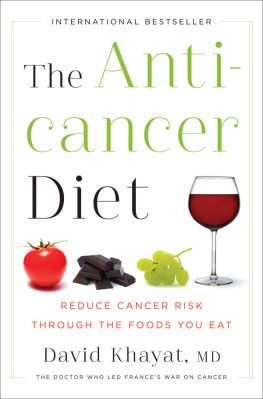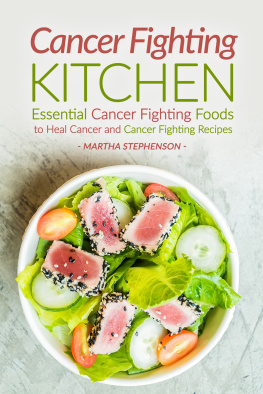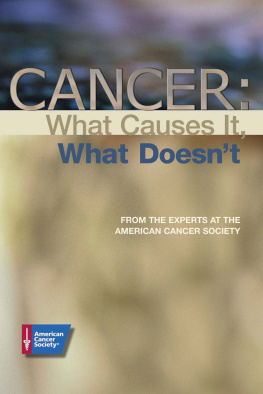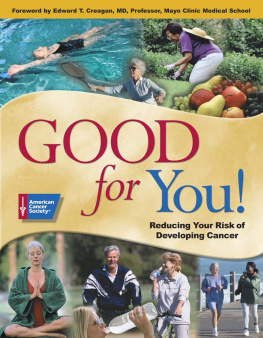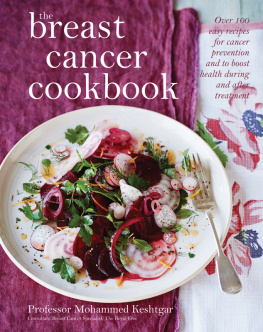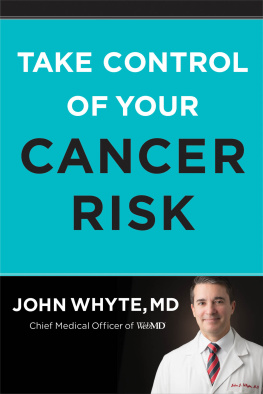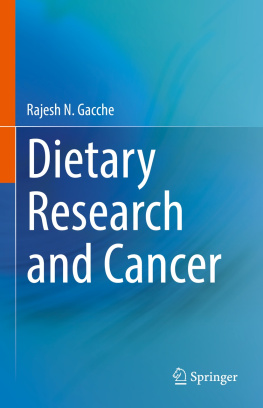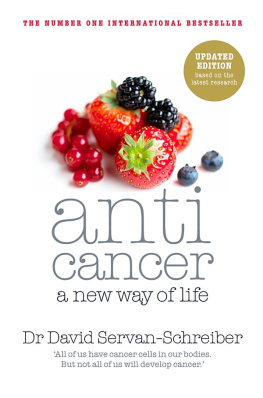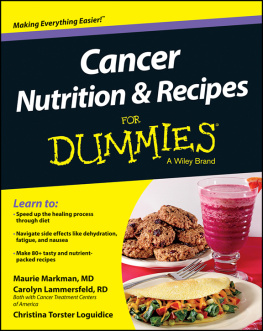
The
Anticancer
Diet
Reduce Cancer Risk
Through the Foods You Eat
David Khayat, MD
WITH COLLABORATION FROM
Nathalie Hutter-Lardeau
and France Carp

Increasing type size may interrupt flow of charts. Landscape mode may help to preserve formatting of charts.
No book can replace the diagnostic expertise and medical advice of a trusted physician. Please consult with your doctor if you are experiencing pain or other symptons of illness, or if you have been diagnosed with any medical condition that requires ongoing care.
Translated by Morag Jordan
Copyright 2010 by Odile Jacob
Translation copyright 2015 by W. W. Norton & Company, Inc.
Originally published in French as LE VRAI REGIME ANTICANCER
All rights reserved
For information about permission to reproduce selections from this book,
write to Permissions, W. W. Norton & Company, Inc.,
500 Fifth Avenue, New York, NY 10110
For information about special discounts for bulk purchases, please contact
W. W. Norton Special Sales at specialsales@wwnorton.com or 800-233-4830
Production manager: Anna Oler
The Library of Congress has cataloged the printed edition as follows:
Khayat, David.
[Vrai rgime anticancer. English]
The anticancer diet : reduce cancer risk through the foods you eat / David Khayat, M.D. ;
with collaboration from Nathalie Hutter-Lardeau and France Carp.
pages cm
Includes bibliographical references and index.
ISBN 978-0-393-08893-9 (hardcover)
1. CancerDiet therapy. 2. CancerNutritional aspects. 3. CancerPreventionNutritional aspects. I. Hutter-Lardeau, Nathalie. II. Carp, France. III. Title.
RC271.D52K5313 2015
616.99'40654dc23
2015000661
ISBN 978-0-393-24647-6 (e-book)
W. W. Norton & Company, Inc.
500 Fifth Avenue, New York, N.Y. 10110
www.wwnorton.com
W. W. Norton & Company Ltd.
Castle House, 75/76 Wells Street, London W1T 3QT
To my mother and father,
who by giving me food gave me so much love.
To my wife and to my darling girls,
our family meals
were such fun when we
were all together!
I miss them.
My thanks to the people who have
helped me write this book:
to Virginie Baffet,
for being so efficient,
to the whole wonderful team
at Atlantic Sant,
and to my friend Roger Mouawad,
always there when I need him.
Contents
A t the time I wrote this book in French, it was exactly thirty years since I had started my professional battle against cancer.
On September 1, 1980, I arrived in the Medical Oncology Department at the Piti-Salptrire Hospital in central Paris.
Thirty years!
I started as an intern at the Paris Public Hospitals, then became an assistant professor, and, a little later, earned my doctorate in medicine. After carrying out research in Israel and then in New York, I earned a second doctorate in human biology.
I was appointed professor of oncology at the Pierre-et-Marie-Curie University in Paris and then given the same appointment as an adjunct professor at the University of Texas at the MD Anderson Cancer Center. Twenty years ago, I became head of the Medical Oncology Department at the Piti-Salptrire Hospital. At the request of then French president Jacques Chirac, from 2002 to 2006 I was responsible for the national cancer plan for France.
And throughout all these years, whatever my title, position, or responsibility, the central thread in my life has always been to treat and look after cancer patients.
For over thirty years Ive been striving to gain a better understanding of cancer, to fight it better, and to get the better of it more often. Ive never given up trying, through endless research, through exchanges with my colleagues (who are the most eminent scientists across the world), through reading absolutely everything available on the subject, and by sounding out ideas and theories with the greatest minds in the field of cancer.
Ive waged this battle alongside thousands of patients, developing a closeness to them that was often akin to true friendship.
Ive often helped them toward recovery; however, too often, Ive seen them die as well.
Ive tried by every means possible to prevent cancer from spreading inside their bodies; at times this involved using procedures so innovative that they seemed totally crazy.
In close combat, with patient after patient, confronting all these countless, mysterious cancers, one after the othera little like a soldier fighting with only a knife for a weaponIve attempted to steer my patients to victory, to recovery.
These battles have been so hard, and my patients suffering has been so great. At every moment throughout my life, sorrow and frustration have been my companions.
With the plan that I suggested to President Chirac, I tried to score some points back from this disease, no longer by fighting for individual patients case by case, but by setting up national strategies to fight cancer: developing screening programs and early diagnostic tests; ensuring that wherever patients were in France, they could all benefit from the very latest treatment; and stimulating scientific research and the development of new tools that would mean better care for all these patients.
However, tragically we are forced to admit that victory still eludes us. At this stage in my life, it seems clear that a very long time ago something should have been done or, in any case, been developed furtherand that is prevention.
That is why I wanted to write this book and set down my thirty years of experience and thoughts. I wanted to impart all my knowledge so that it can be shared with as many people as possible, so that together we can speak about hope and tell ourselves that thanks to all the work done, our children will perhaps one day live in a world that is rid of the threat of this nasty disease once and for all!
Unlike the people who want to draw up rules based on their own particular, personal experience of cancer, rules that they would like to impose on everyone else, without even exercising the caution of qualifiers such as might, possibly, and so on, as befits any proper researcher, this book is the sum of my over thirty years of research into cancer, both in laboratories and at patients bedsides, in France and in the United States. Its legitimacy is beyond dispute, especially as its the result of a successful collaboration between a cancer specialist and a preeminent nutritionist.
DAVID KHAYAT
April 2010
The
Anticancer
Diet
B reast cancer is far less common in Japanese women than in American women. Why is this so?
An even more surprising question is, why is it that when Japanese women emigrate to the United States, from the second generation onward, theyre at as much risk of developing breast cancer as American women?
Has the genetic makeup of these Japanese women suddenly changed? Of course not, nothing of the sort! They still look just like Japanese women, and in their outward appearance nothing has changed.
Have they been subjected to some sort of carcinogenic process? Is there really so much more pollution in American cities than in Tokyo or Osaka? Definitely not. Quite obviously neither is true!
Then how do we explain this phenomenon? What is happening to these women that within scarcely two generations, a risk so significant, so specific, and so life-threatening can be modified to this extent?
In actual fact, only one thing has happened, and it demonstrates vividly what this book is all about.
Next page
